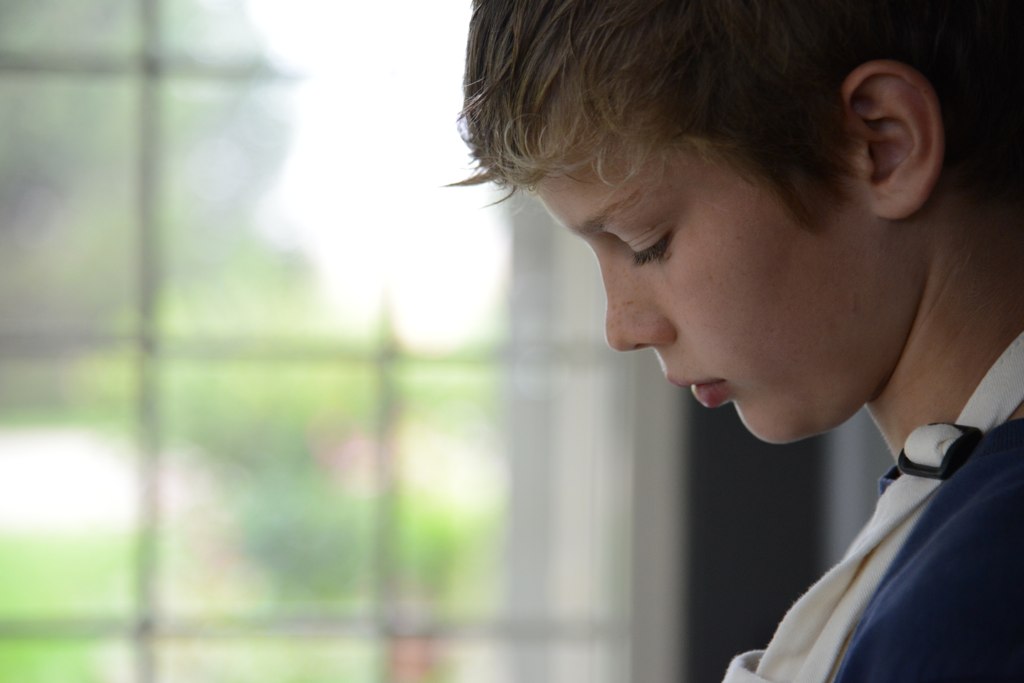Clay and Sally Clarkson have followed the beat of God’s heart for parents during more than three decades of personal ministry. Their books and messages, born out of their own family life, are woven into the fabric of my own life tapestry, bringing color and beauty wherever their thread runs. They have given their whole hearts to helping parents raise wholehearted children for Christ with faith, grace, love, and joy. No one has mentored me quite like Sally Clarkson, who has poured tea for me, and poured life into me, from a deep well of wisdom and a well-lived life. She and Clay have raised four children, now grown, who are walking the path of life with God, already leaving the marks of His image in them on their worlds. It is a delight to invite them to my front porch to today to share about opening children’s eyes to the light of divine imagination…
guest post by Clay and Sally Clarkson
Each of our children experienced doubt at some point during their youth.
We didn’t consider it a failure of our spiritual parenting but rather a natural part of their maturation and faith experience.
It meant they were thinking deeply about what they believed, wanting to own their beliefs.
We would pray with them, share Scripture, and talk through their concerns, but sometimes that wasn’t enough.
One of our children, though very knowledgeable about Scripture, went through an extended period of private doubt in the late teens, struggling to make sense of Christianity and life.
Later we would learn what “saved” this child from doubts—imagination.
Specifically, it was reading J. R. R. Tolkien’s fantasy trilogy The Lord of the Rings.
This child found in Tolkien’s epic story of goodness overcoming evil a literary parallel to the divine metanarrative of the Bible, an imaginative path to finding a place in God’s epic story of creation, fall, redemption, and restoration.
The story of Frodo, Sam, Gandalf, Aragorn, and all the others involved in the struggle for Middle Earth proved to be a lifegiving metaphor of this child’s own struggle to find a place in God’s story.
Imagination is important.
Most Christian parents do not fear imagination, but neither do they especially respect its power in children’s lives.











It’s easy to wrongly assign it to the category of pleasant childhood diversions that will pass in time as their children grow into young adulthood. But children’s developing imaginations need to be properly fed in order to grow into mature imaginations that can anchor the deepest, most meaningful concepts in Scripture.
A faith that is uninformed or uninspired by the images, metaphors, symbols, and stories of God’s Word is in danger of becoming unimaginative and unanchored, weakened by an overreliance on reason, adrift on a shallow sea of facts and propositions.
God imagined the entirety of creation in eternity past before He ever spoke the first “Let there be . . .” of His epic story, creating every micro and macro part of His infinitely complex, undeniably beautiful and “good” creation.
He left His signature on His work in the imago Dei that’s written indelibly on our souls. We dare not fail to respect the power of His imagination in us or our children.
Imagination is important for our children for one overriding reason—it is the faculty by which they will believe.It’s easy to make the mistake of thinking that imagination, like inspiration, is a kind of passive mental state.
Rather, it is more like a muscle that will become stronger or weaker depending on how it is fed, exercised, and used.
Christian author Caryn Rivadeneira makes the faith connection: “Without imagination—without the ability to picture what is unseen, to believe what is unknown—how can we have faith? Without imagination, without the ability to imagine a ‘preferred future,’ how can we hope? Without imagination, how can we experience the majesty and wonder and nearness of a mysterious God?”
The world says, “You’ve got to see it to believe it,” but biblical belief turns that on its head, saying, “You’ve got to believe it to see it.”
In other words, there is a kind of seeing that starts with belief: “Now faith is the assurance of things hoped for, the conviction of things not seen” (Hebrews 11:1; emphasis added). The author of Hebrews asserts that the “conviction” of faith, or belief, enables us to see the “not seen” things of God.
Similarly, Paul prays that God will give the Ephesians spiritual eyes—eyes of the heart—to see all that He has done for us as believers: “I pray that the eyes of your heart may be enlightened, so that you will know what is the hope of His calling, what are the riches of the glory of His inheritance in the saints, and what is the surpassing greatness of His power toward us who believe” (Ephesians 1:18-19, emphasis added; see also 1 Corinthians 2:6-13).
If you want your children to “see” all the unseen ways God tells us He blesses His children now and in eternity, a well-formed Christian imagination is the starting place.Henry David Thoreau, a nineteenth-century author, naturalist, and poet, said, “It’s not what you look at that matters, it’s what you see.”
Two people can look at the same pretty flower and “see” different things—one a pleasant happenstance of nature, the other a beautiful piece of artwork by the Creator.
The difference is imagination.
When you form your children’s imaginations, you are training them to see more than just what is there—to look at the world, nature, people, and even daily life with the same eyes of the heart that God gives us to see His redemptive work in eternity.
The apostle Paul exhorted, “Set your mind on the things above, not on the things that are on earth” (Colossians 3:2). He commands us to be “minded” about the things above that we can see only with eyes of the heart, not the things below that we see with the eyes in our head.
To obey Paul’s command for your children means giving them more than a rational faith—it means also giving them a well-formed Christian imagination that can look at a starry night sky and see more than the infinite reach of empty space and the eternal stretch of endless time, that can “keep seeking the things above, where Christ is, seated at the right hand of God” (3:1).
You are giving your children eyes to see and believe.
Forming your children’s imaginations—opening the eyes of the hearts—is a distinctly lifegiving part of your parenting that connects your children with the life of God in your home.
You are putting them in touch with the image of God within them, which connects them with the living God who put it there.
A well-formed imagination is a bridge to an expanded understanding of life that can shape and influence everything your children will become by faith.
So, use your imagination, and theirs, to build that bridge.
Clay and Sally Clarkson have been giving parents help and hope for over three decades, mostly through Whole Heart Ministries, the Christian home and parenting ministry they began in 1994. Clay, a graduate of Denver Seminary, has written books on biblical and practical parenting, including Our 24 Family Ways and Heartfelt Discipline. Sally’s extensive ministry has influenced countless mothers through 22 years of conferences, Mom Heart groups, her blog and podcast, and now her LifewithSally.com membership site. Her nearly 20 books, including The Mission of Motherhood, Desperate, and The Lifegiving Home, encourage mothers around the world.
In The Lifegiving Parent: Giving Your Child a Life Worth Living for Christ, Clay and Sally explore eight key principles—heartbeats of lifegiving parenting—for creating a home where children experience the living God alive in their family. Through biblical insight and personal family stories, the Clarksons provide understanding, wisdom, and tools to equip parents to give their children not just a good Christian life, but the life of Christ.
[ Our humble thanks to Tyndale for their partnership in today’s devotion ]








